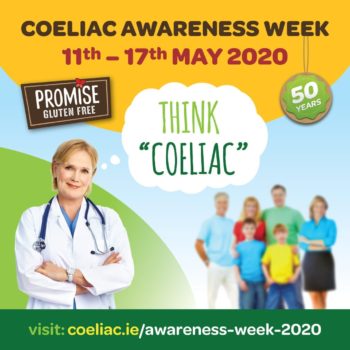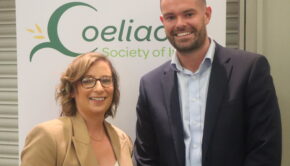New ‘coeliac alert’ system to help GPs identify 37,000 undiagnosed sufferers

Initiative launched at start of Coeliac Awareness Week and Society’s 50th birthday
11 May 2020
The Coeliac Society of Ireland is to develop a “game-changing” alert system to help GPs diagnose the estimated 37,000 people in the state who are suffering from coeliac disease.
The announcement comes at the start of Coeliac Awareness Week 2020 (11-17 May), which is sponsored by Promise Gluten Free, as the society marks 50 years helping people with the condition while many of its members cocoon at home in order to stay safe during the coronavirus pandemic.
Misdiagnosis is the biggest issue for people with coeliac disease in Ireland. Three out of every four of the 50,000 people understood to have the condition, have yet to receive a formal diagnosis despite many of them spending years seeking treatment for their symptoms.
The new Coeliac Alert will plug into the Socrates software system used by 50% of Irish GPs and will be capable of generating two types of alerts. The first – the Coeliac Finder Group Alert – triggers when a patient presents with symptoms common to coeliac disease, such as irritable bowel syndrome, iron deficiency or osteoporosis, and suggests the doctor investigates coeliac disease as a diagnosis.
The second alert – the Coeliac Register Group Alert – triggers after a patient is diagnosed with coeliac disease, prompting the GP to check family members for coeliac disease. One in every 100 people in Ireland has coeliac disease – based on EU average incidence rates – a ratio which drops to one in 10 if an immediate family member has the condition. There is currently no national register for coeliac disease.
The Coeliac Society is able to fund the development of the Coeliac Alert software thanks to an anonymous donor. CEO Gill Brennan says that the generous donation could bring relief for tens of thousands of people who are suffering unnecessarily.
“This is a phenomenal step forward considering that 74% of all coeliac sufferers are currently undiagnosed,” said Brennan.
Coeliac disease has no cure; the online treatment is a strict gluten free diet for life. People with undiagnosed coeliac disease have increased risk of early-onset osteoporosis, infertility, growth failure and stunting (in children), and bowel cancer. The Coeliac Society is encouraging doctors to ‘Think Coeliac’ and assist them in speeding up the diagnosis process.
“Research amongst our members has shown that it can take up to 10 years for someone to be diagnosed with coeliac disease from the onset of symptoms,” Brennan added. “This is wholly unacceptable and the new Coeliac Alert will help to diagnose patients much quicker and reduce the unnecessary suffering of those with the disease who don’t know they have it. After the initial roll out on the Socrates system, we will look to secure more funding to make it more widely available through other GP software providers.”
It is anticipated that software for the Coeliac Alert will take five months to develop, followed by a three-month trial with two or three GP surgeries, before it is rolled out across the Socrates GP system nationally in late 2020 or early 2021.



 Print
Print




Fans 0
Followers